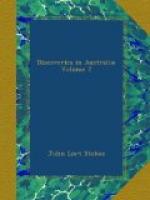The reader will remember the native named Alligator, whom I have mentioned on a previous visit to Port Essington. I witnessed in his family an instance of affection for a departed child, which, though it exhibited itself in this peculiar manner, was extremely touching. The wife had treasured up the bones of the little one, and constantly carried them about with her, not as a memento mori, but as an object whereon to expend her tenderest emotions, whenever they swelled within her breast. At such times she would put together these bones with a rapidity that supposed a wonderful knowledge of osteology, and set them up that she might weep over them. Perhaps, in her imagination, as she performed this melancholy rite, the ghastly framework before her became indued with the comely form of infancy; bright eyes once more sparkled in those hollow cells, and a smile of ineffable delight hung where, in reality, was naught but the hideous grin of death. I exceedingly regret that the mother who could feel so finely was some time afterwards over-persuaded to part with the bones of her child.
I may here mention that the medical officer of the settlement was in the habit of extracting teeth for the natives, who found the European method much more easy than their own mode of knocking them out. The supercargo of a vessel, learning this fact, was anxious to become a purchaser of teeth to some extent for the London market, being persuaded that they would find a ready sale among the dentists; and it is more than probable that many of our fair ladies at home are indebted for the pearls on which the poets exhaust so much of their fancy to the rude natives of Australia.
Among the information I gained during this stay at Port Essington respecting the Macassar people, who periodically visit the coast, was that of their discovering a strait leading into the Gulf of Carpentaria, behind English Company’s Islands. Passing Cape Wilberforce, called Udjung Turu, or Bearaway Point, they continue their course down the Gulf to the Wellesley Islands, named by them Pulo Tiga, or The Three Islands; this is the usual southern limit of their voyage. The Macassar proas that visit Port Essington, amounting in one season to fourteen, usually brought for barter tea, sugar, cloths, salt-fish, rice, etc. Several of the nakodhas, or masters, have expressed a wish to abandon fishing, and occupy themselves only in trade, if there is sufficient encouragement held out to them.
During our stay a report was brought into the settlement by the natives that there was a large vessel wrecked on the mainland, near the Alligator Rivers, which was accompanied by so many details of place and circumstance that Captain Stanley was induced to send Lieutenant Vallack, of the Britomart, away in the decked tender to procure information, and to render all assistance in his power. He was accompanied by several of the Port Essington natives; and on arriving at the




